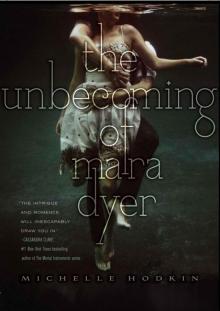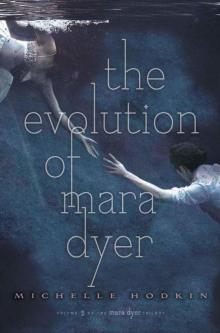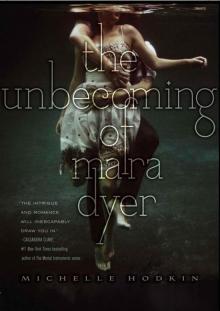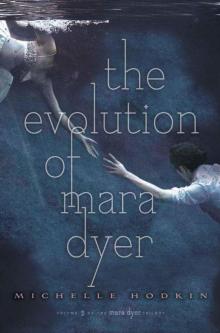- Home
- Michelle Hodkin
The Reckoning of Noah Shaw Page 6
The Reckoning of Noah Shaw Read online
Page 6
And I can’t. I am as powerless now as I was when Jude took her. I fail Mara again and again and the rush of remembering comes in a wave and hollows me out.
The glass darkens, rendering Mara invisible again, throwing my own reflection back at me instead. I look like the ghost of a stranger. I stand there for minutes or hours, I don’t know.
“Noah?” Dr. Kells’s poisonous voice interrupts the extreme silence. I don’t answer.
“Would you like to be taken back to your room?”
I am quiet.
“The silent treatment?” she asks, dripping sarcasm. “That’s a bit juvenile, no?”
I stay calm, and manage to speak instead of scream. “What point is there in talking to you? Every word that comes out of your mouth is a lie.”
A slight pause. Then, “You can tell when someone’s lying, can’t you?” Kells asks.
I ignore the question.
“You can hear the spike in a person’s heartbeat. A faster pulse. You can hear physical stress, can’t you, Noah?”
“Is that why you refuse to be in the same room as me?” I ask her disembodied voice whilst staring at my own empty eyes.
“On the contrary. I would very much like to be in the same room with you.”
“And yet.”
“All right,” she says. “Let’s change that. I want nothing more than to have an honest conversation with you—”
“I doubt that very much.”
“And I want you to be able to hear that what I’m telling you is the truth,” she continues. “I’ll have someone arrive to escort you to someplace we can talk.”
“Why bother?” I ask, not moving. “I’m right here.”
“That room isn’t suitable.”
“Oh?”
“There’s only one chair,” she explains.
My eyes narrow. “Which I’m not sitting in.”
“I’d like for both of us to be comfortable.”
“Then you can bring another. The mathematical possibilities are endless.”
Kells ignores this.
“It wouldn’t be because the glass isn’t reinforced, there, would it? You wouldn’t have lied about that, right?”
“I’ll send someone right away to pick you up.” The sound clicks off.
Dr. Hannah Walsh, anaesthesiologist, arrives a few moments later. The door unlocks, swings in. Dr. Walsh doesn’t move, but she does smile when she sees me.
It takes an extreme act of will to force a smile in return, but I do it. If I can’t charm her then I can’t use her, and if I can’t use her then I can’t get us out.
But I will get us out. Even if I have to make my own key.
She leads me to a different room, this time—an open space, echoing the shape and expanse of the Zen garden at Horizons. But instead of manicured trees and sand and bamboo in the centre, this room features a barred cell. A cage.
The walls are striped, pea green and off-white, giving it the feel of an old hospital, or a gymnasium. Dr. Walsh glances up at me once we arrive. “I’m going to change your restraints, now.” I hear a tremor of uncertainty in her voice. She is nervous.
“Why?” I ask plainly.
Her tone shifts. She’s professional now. “Is it going to be a problem?”
I raise my eyebrows. “No,” I say. “Just curious.”
She takes my arm and leads me to a chair beside the cage, where a set of metal wrist and ankle shackles rests. “These should allow you a bit more freedom,” she says, showing them to me, and it’s all I can do not to glare. “They’re forward facing, so your shoulders will get a break,” she explains.
And they will make it impossible to run. “More freedom?” I ask, casting them a lingering look.
Dr. Walsh doesn’t answer my question. She just leans in, tilting her head up toward my ear, and says, “As long as you’re calm, everything’s going to be fine.”
I can’t remember the last time anything was fine.
She indicates for me to sit. I obey. I allow Dr. Walsh to remove the buckles from my wrists, and once they’re gone, my shoulders roll forward, aching with the movement. It doesn’t quite hurt, but I wince anyway.
“Painful?” she asks.
I nearly laugh. Instead, I cast my eyes down to the tile floor. “I’ve had worse,” I say, injecting a hint of vulnerability into my voice. A quick glance at her, meeting her eyes. Then away, feigning embarrassment.
“I’ll see what I can do about getting you some pain meds,” she says, and holds out her hands.
In the few seconds before my hands are shackled together once more, I could hit her. For these few seconds, I am free and she is vulnerable. I remember it, watching her hands as they buckle and tighten and snap leather and metal into place on my wrists, my ankles. I memorise it.
After Dr. Walsh finishes, I ask her, shyly, to help me stand. She bites her bottom lip; her fingers graze my biceps tentatively at first. I allow the corner of my mouth to lift in a smile. “Thank you,” I say, my voice low.
Her grip tightens, solid on my arm as I allow her to guide me into the cage. She withdraws something from her pocket—another mistake. She ought to have already had it out; in the four seconds before she locks the barred door, I could slam it back and knock her over.
I remember that, too.
Just as Dr. Walsh locks it behind me with a manual key, I hear the click of an approaching pair of heels on the tile. Dr. Kells emerges from the hallway just as Dr. Walsh turns to leave.
I am fighting for calm.
“Hello, Noah,” she says with freshly lacquered lips. She’s dressed as if she’s the head of Human Resources—which, in a way, actually, she is. The sleeves of her lab coat are rolled up over a silk blouse and pencil skirt; her Horizons uniform. She walks to a table rather far from the cage, and sits behind it. “Have a seat,” she says smoothly.
I do as she says, maintaining eye contact the entire time.
“On the floor in front of you is a piece of paper,” she says, tipping her head at it. “You should still be able to pick it up in that position.”
I am, and I do. I crouch down, lift it, and read what it says:
Double-Blind
S. Benicia, manifested (G1821 carrier, origin unknown); side effects(?): anorexia, bulimia, self-harm. Responsive to administered pharmaceuticals. Contraindications suspected but unknown.
T. Burrows, non-carrier, deceased.
M. Cannon, non-carrier, sedated.
M. Dyer, manifesting (G1821 carrier, original); side effects: co-occurring PTSD, hallucinations, self-harm, poss. schizophrenia/paranoid subtype. Responsive to midazolam. Contraindications: suspected n.e.s.s.?
J. Roth, manifesting (G1821 carrier, suspected original), induced; side effects: poss. borderline personality disorder, poss. mood disorder. Contraindications suspected but unknown.
A. Kendall: non-carrier, deceased.
J. L.: artificially manifested, Lenaurd protocol, early induction. Side effects: multiple personality disorder (unresponsive), antisocial personality disorder (unresponsive); migraines, extreme aggression (unresponsive). No known contraindications.
C. L.: artificially manifested, Lenaurd protocol, early induction, deceased.
P. Reynard: non-carrier, deceased.
N. Shaw: manifested (G1821 original carrier); side effects(?): self-harm, poss. oppositional defiant disorder (unresponsive), conduct disorder? (unresponsive); tested: class a barbiturates (unresponsive), class b (unresponsive), class c (unresponsive); unresponsive to all classes; (test m.a.d.), deceased.
Generalised side effects: nausea, elevated temp., insomnia, night terrors.
My eyes linger on certain words:
Carrier. Manifesting. Side effects. Lenaurd.
Deceased.
“I’d like to explain what you’re looking at,” Dr. Kells says, “if you’ll allow me.”
Everything I see, hear, read, experience in this place, at Horizons, leads to question after question. I can’t keep them straight,
but it hardly matters. Dr. Kells is a manipulator. A liar. Better, possibly, than even me.
“I’ll take your silence as assent,” she says, seeming excited. “The gene indicated on that list you just read, G1821, operates in many ways like cancer. There are environmental and genetic factors that can trigger it, and when triggered, the gene turns on, like a switch, activating an ability in its host. But as you’ve witnessed,” she says, offering me a narrow look, “the gene also appears to turn off certain switches.” She pauses. “Like the instinct for self-preservation.”
Her pulse is even and steady. I listen so I can remember the sound, the rhythm, should it change.
“Certain thoughts and behaviours can become compulsive, such as the urge to self-harm. That seems to be true in your case, yes? You’re able to heal, but you experience suicidal ideation, don’t you?”
My face is blank.
“That was a question, if you couldn’t tell.”
“I could tell.”
Dr. Kells leans forward on her hands just slightly. “How about this,” she says, considering me. “I’ll answer one of your questions, and then you answer one of mine.”
“Fine,” I say flatly. “I’ll go first.” There’s quite a lot I’m desperate to know, but I ask the only thing that matters. “What did you do to Mara?”
“I gave her an infusion of a variant of sodium amytal we’ve developed—it’s called Anemosyne.”
“What does it do?”
“It ameliorates her agency.”
“Meaning?”
“Technically, that would be three questions,” she says. “What I gave her, and what it does, and the impact it will have on her.”
My eyes narrow to slits as I expect her to shut me down, to deflect and redirect back to me. She answers, though, surprisingly. “The drug separates the borders between the unconscious and the conscious. We think what’s happening to Mara—and, quite possibly, all of you—is that when G1821 is activated, when that switch turns on, your conscious thoughts and unconscious desires and instincts merge. It acts somewhat like a reflex. In Mara’s case—you’ve heard the term ‘id,’ I gather?”
I listen to the steady beat of her heart. “Yes,” I say.
“Good. That will make this easier to explain.” She takes out a notebook and writes three words, holding them up for me to read: “id,” “ego,” “superego.”
It’s a good thing I’m in shackles, because Freud bores the shit out of me.
“If the ego is the organised part of her mind, and the superego plays the moralising role, allowing her to distinguish between good and evil, then the id is just a bundle of instincts. It strives only to satisfy its own basic needs, like hunger and the drive for sex. It knows no judgements and does not distinguish between moral or amoral.
“In normal people, non-carriers, the ego mediates between the id—what a person wants—and reality. It satisfies a person’s instincts using reason. The superego acts as the conscience; it punishes through feelings of remorse and guilt. These feelings are powerful, and in normal people, the ego and the superego dominate the id.” She puts the notebook down. “Mara is not a normal person.”
“Shocking,” I say.
Kells goes on, as if she hasn’t heard me. It’s less of a conversation than a performance. “As you’ve seen,” she says, “Mara appears to have the ability to manifest thought into action, but it’s dependent on the presence of fear or stress, as I believe it is for the other carriers, though Roth’s manifestation is in its infancy so there can be no confirmation yet. In any case, G1821 makes Mara’s id reflexive; if she is afraid, or stressed, her ego and superego don’t function. And the consequences, as you’ve seen, can be disastrous. Her ugliest, most destructive thoughts become reality.”
“The solution seems simple,” I say.
“Does it?”
“Stop fucking with her.”
Kells leans forward, eyebrows raised. “Was that what her Spanish teacher did? Gave her a failing grade, signed her own death warrant?”
“Mara didn’t know what she could do then,” I say defensively. “I’ve wished several people dead over the course of my teenage life.” I lean back, raise an eyebrow. “I’m wishing one of them dead right now.”
“But your desires don’t come true,” Kells says. “The only person you’re able to hurt is yourself.” She cocks her head, and a curious little smile overtakes her mouth for a split second before her personality evaporates again. “Mara doesn’t even always have to be aware of these thoughts, of her intent behind them. If the right mixture of fear or stress is present, her instinctual drives take over. And there’s a Freudian theory that along with the creative instinct—the libido—a death instinct also exists. A destructive urge directed against the world and other organisms.” She clears her throat. “My working theory is that carriers of G1821 have an exaggerated death instinct, which manifests for each of you in different ways, making some of you vulnerable and some of you dangerous. And Mara’s more dangerous than any of you.”
“You can’t punish her for something she can’t control.”
“As I said, I’m not attempting to punish her, I’m attempting to help her. The drug we’ve developed will, we hope, reactivate the barrier between her id and her ego and superego; it’s designed to prevent any negative intent from becoming action. The dose needs to be adjusted, however, and I can’t study Mara on drugs. And she’s too unstable to be studied without them. So,” Kells says, drawing herself up, “I need to study you.”
13
THINGS CANNOT BE OTHERWISE
SO MARA WAS BAIT,” I say slowly. “To get me here.” My voice sounds distant, faraway, to my own ears.
“Partly true,” Kells concedes. “I did need Mara here at Horizons because, at the absolute least, she needs to be receiving a constant, consistent dose of Anemosyne in order to separate her conscious thought from her unconscious thought. To prevent her thoughts—which are often negative, if you noticed—from becoming reality.”
And to make her sound like that thing in there, that not-Mara I heard, speaking with that deadened voice I’d do anything to forget.
“So what, exactly, do you plan to do with the rest of us? You have Jamie and Stella here as well, yes?”
“Yes.”
“Three drugged dolls at your disposal, which you’ve just acknowledged renders them useless to you. So why bother keeping them at all?”
“To help—”
“Like you helped Phoebe?”
“Phoebe’s death was unfortunate—”
“Interesting choice of words.”
“If you’d let me finish a sentence, I’d explain.” She shoots me a pointed look. “They could also be a danger to themselves or others, just like Mara. Stella perhaps less so than Jamie—her status is less clear. But the point is, G1821 expresses itself differently in different people, and like many other genes linked to diseases, the symptoms vary. Jamie, for example, is earlier on in his manifestation than Mara—in his case, G1821 was only recently triggered.”
“How?” I ask.
“We think it might be linked to the physical development you undergo as teenagers. The teenage brain is physically different from an adult brain. Right now, it looks like the process is slightly different for all of you, accounting for all sorts of environmental and genetic factors, somewhat like puberty. Everyone develops at a different rate. The same is true for G1821.” She gestures, palms up. “Sometimes, in order to bring the greatest good to the greatest number of people, a few are hurt in the process.”
“Not hurt,” I say, leaning forward. “Murdered.” My face is stone, impassive, and my voice is sharp. “You allowed—no,” I say, shaking my head. “You invited a psychopath into Horizons and allowed him to murder two girls—or was it more?”
“I assume you’re referring to Jude Lowe?” Kells asks.
“You assume correctly,” I snap. “I fail to see how any part of what you’ve done to Mara—to anyone—can at all qu
alify as good.”
“Jude was needed to trigger Mara,” she says. “We know that at least two of the triggers for G1821 are fear and stress.”
Fight or flight.
“And in order to see what Mara was capable of, she needed to be pushed.”
“Provoked,” I say evenly, though inside, I am seething.
“In a sense,” Kells says, “yes. But I prefer the term ‘exposed.’ ”
“I bet you do.”
A muscle twitches in her jaw. “Jude was needed in order to expose Mara to what she was most afraid of, in order to know whether her ability would manifest, and in order to study it—its consequences and its limitations for her eventual benefit and for the benefit of everyone around her. Exposure therapy is used in order to accommodate patients to their triggers and their fears—”
I bite back the anger because I need to stay calm. Focused. “That’s not what you were doing,” I say. “You weren’t confronting Mara with her worst fears and showing her that they were meaningless, harmless, so she could overcome them, so she could get better. You were provoking her, terrifying her to get her to react—you wanted to make her worse.”
Kells shakes her head. “No. Look what happened at the final stage—she overcame her fear of Jude and fought back. She unlocked reserves she didn’t even know she had.”
For a moment, I can’t speak. Kells isn’t lying—she actually believes in what she’s saying. “You sent that animal into her house to torment just so you could watch,” I say. Unconsciously, my hands have curled into fists. Kells notices. I struggle to relax. “Like some attack dog, like a pet—”
“He’s not a pet, Noah. He’s a participant in the program.”
“Why would anyone be a part of this?” I ask, but even as I do, I remember Jude’s words, what he said to Mara, what Stella heard in his mind—
“You told him Mara could bring Claire back,” I say. “You promised him the thing he wanted most. Something Mara couldn’t deliver, to trigger him into triggering her.”
“To expose her—”
“You’re using him the way you’re using all of us.”

 The Becoming of Noah Shaw
The Becoming of Noah Shaw The Unbecoming of Mara Dyer
The Unbecoming of Mara Dyer The Retribution of Mara Dyer
The Retribution of Mara Dyer The Evolution of Mara Dyer
The Evolution of Mara Dyer The Unbecoming of Mara Dyer md-1
The Unbecoming of Mara Dyer md-1 The Evolution of Mara Dyer md-2
The Evolution of Mara Dyer md-2 The Reckoning of Noah Shaw
The Reckoning of Noah Shaw